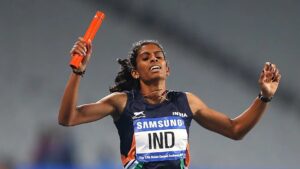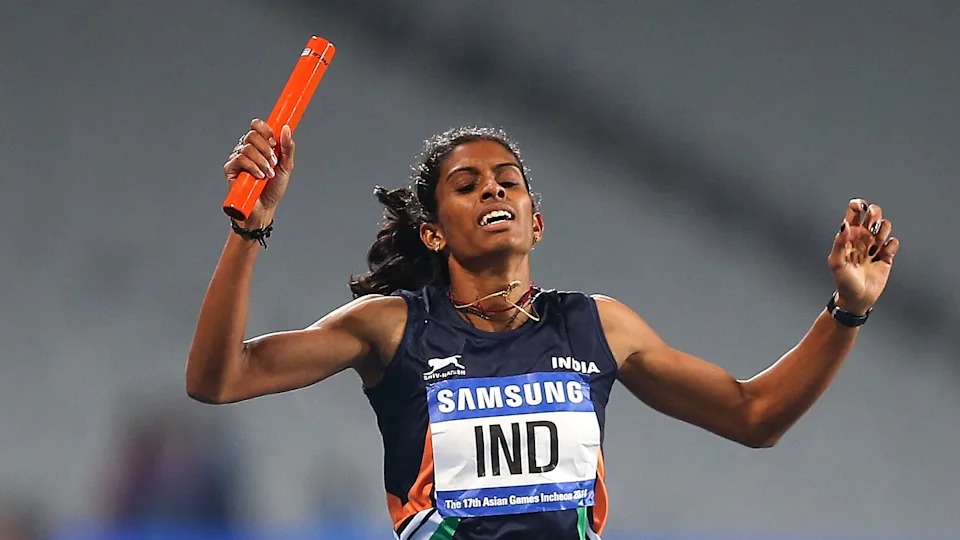
The anti-doping case of track veteran MR Poovamma has had more twists and turns than a potboiler, the latest leading to her running the anchor leg for the Karnataka women’s 4x400m relay team in the National Games athletics competition in Goa on Wednesday.
This comes barely a week after a National Anti-Doping Agency Appeal Panel (ADAP), directed by the Kerala High Court, revisited its decision and allowed Poovamma to return to competition several months ahead of the June 2024 date.
Chaired by Abhinav Mukherji, the panel skipped making an admission that it had been slack in not setting the date from which its sanction would come into effect when it first passed an order in September last year. And curiously, it glossed over the delays attributable to the athlete in the hearing process in revising its own order on October 27.
At the root of the ADAP’s decision to revise its own order is the fact that Justice Devan Ramachandran of the Kerala High Court agreed with the argument put forth by Poovamma’s counsel Rajith that since the athlete’s results were disqualified from February 18, 2021, her two-year ban should start from that day.
The Central Government counsel, Mini Gopinath, opposed such a line of thinking and argued that the penalty would start on the day on which the NADA Appeal Panel decision is entered in the Anti-Doping Administration & Management System (ADAMS) and hence Poovamma’s ban would start on June 16, 2022.
“If the contentions of Smt. Mini Gopinath is to be accepted, then the detriment the petitions would have to face, prima facie, would run from February 18, 2021, till June 16, 2024, which would be much more than two years. When a penalty is imposed on an athlete, it is expected to be in force only for the particular period statutorily mandated,” the judgement said.
“Even though the Competent Appellate Authority order that her penalty would be for two years, but without specifying a date for it to commence; and if it is to be assumed – edifice on Clause 15.2.2 of the (Anti-Doping) Rules – that it would have to be from the date on the case was settled, namely June 16, 2022, then the observations that her medals, points and prizes would stand forfeited from February 18, 2021 – certainly appears to be, at first blush, anachronistic,” it said.
Further, Justice Devan Ramachandran wrote: “I am, therefore, of the firm view that the matter will have to be reconsidered by the Anti-Doping Disciplinary Panel particularly because an application has already been preferred before them by the petitioner seeking clarification/ rectification.”
He issued a clear direction to ADAP. “I allow the Writ Petition, directing ADAP to immediately hear the petitioner, adverting to his observations; thus culminating in an appropriate clarificatory order as expeditiously as is possible, but not later than one month from the day of receipt of a copy of this judgement,” he wrote.
On a reading of the High Court judgement, it becomes clear that NADA was not able to explain to Justice Devan Ramachandran the difference between non-specified and specified substances, the mandatory and voluntary provisional suspensions that they respectively draw as per the National Anti-Doping Rules.
NADA also made no attempt to convince the court that starting a ban on the date of the order in such instances is the norm when an athlete does not opt for voluntary provisional suspension after testing positive for a specified substance. An athlete signs up for all results to be annulled from the date of sample collection when not opting for a voluntary provisional suspension.
Curiously, in its order, ADAP has now advised NADA to take note of the Kerala High Court’s interpretation of the rules that can lead to more cases where athletes do not accept provisional suspension, the effect of the rules would stand ‘obviated’ since it would amount to retrospective sanctions being imposed beyond prescribed periods.
To be sure, NADA would do well to challenge the Kerala High Court judgement, especially with respect to the automatic disqualification of results through the commencement of the ineligibility period in addition to the penalties imposed on an athlete who has been held guilty of violating the provisions of the anti-doping rules.
In its revised order, ADAP, which included Dr Vivek Singh as well as Prashanti Singh, stated that the delay while processing the case was the reason it decided that Poovamma’s ineligibility period would commence from the date of sample collection, February 18, 2021, rather than June 16, 2022, the date of the order of the ADDP.
There was also no mention of why in its original order of September 17, 2022, it had not mentioned the date of commencement of the two-year ban. In fact, the ADAP must own up to responsibility for its failure to specify that the ban would commence on June 16, 2022, the day the ADDP established that Poovamma had violated the anti-doping rules.
It remains the single biggest oversight that led to things coming to such a pass. There were other delays in the result management process, some of it due to the National Anti-Doping Agency but more due to the athlete seeking time – first to secure the laboratory documentation, then because her counsel had not been well and finally to get some supplements tested in a private laboratory.
Besides, a NADA official wrote an e-mail to the Athletics Federation of India stating that Poovamma could compete from June 16, 2023. It led to her showing up at an event in Sri Lanka. When there was a storm in the media, NADA realised its mistake and wrote back saying that she was ineligible until June 2024. That made her move to the Kerala High Court with success.
In its latest order, in the wake of Justice Devan Ramachandran’s judgement, ADAP offered no explanation to why it had ignored “the delay while processing the case’ when it heard NADA’s appeal against the ADDP order that had imposed a three-month ban on Poovamma. After all, in September 2022, it had decided – rightly so – to increase her sanction to two years.




